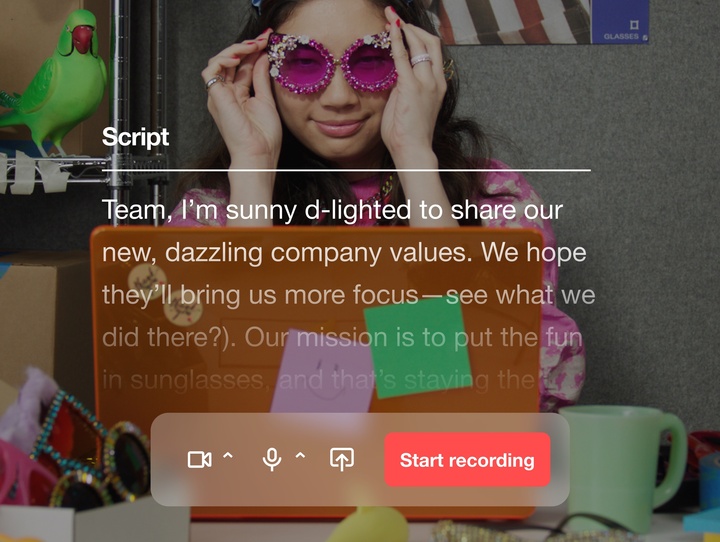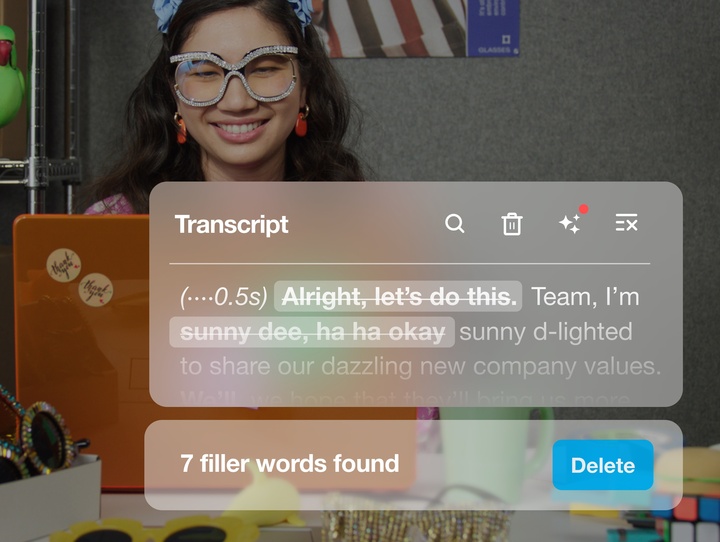Vimeo intros a trio of AI-powered editing features
Vimeo, the video hosting and sharing platform, is embracing AI in a major way.
This week, Vimeo announced a suite of AI-powered tools designed to help users create scripts, record footage using a built-in teleprompter and remove long pauses and unwanted disfluencies like “ahs” and “ums” from the recordings. They’ll be available starting July 17 as a part of Vimeo’s Standard plan, which costs $20 per month (billed annually).
Ashraf Alkarmi, Vimeo’s chief product officer, says that the new capabilities are aimed at entry-level video creators — like CEOs, employees and social media managers — who lack the skills, time and resources to achieve the effects that they want to achieve.
According to Vimeo’s internal research, 50% of its customers do multiple takes while creating a video, and — of those who reshoot — 25% do over five takes.
“Despite being the most effective way to communicate powerful messages, video production inherently creates a barrier to this preferred communication channel,” Alkarmi told TechCrunch via email. “Our latest AI-powered workflow reduces those barriers, giving any creator the confidence to actually create videos in one take.”

Generating a script using AI, with Vimeo’s new tool.
To that end, Vimeo’s new script generator uses generative AI — specifically the OpenAI API — to create a video script based on a brief description and key inputs, such as tone (e.g. “confident,” “inspiring” or “casual”) and length. The teleprompter tool offers a script display that can be customized with different font sizes and pacing, meanwhile, while the text-based video editor automatically identifies and deletes filler words and awkward pauses.
Alkarmi sees the tools being used to quickly create highlight reels, host virtual events or company meetings and export quote clips for short marketing videos.

Vimeo’s teleprompter.
“One of Vimeo’s biggest misconceptions is that we’re an entertainment hub, but we’ve come a long way over the years,” Alkarmi said. “Our goal is to help any business use video the same way that they use text or image as a powerful way to communicate to both internal and external audiences.”
Leveraging AI to achieve those ends is trendy, of course. But Alkarmi notes that Vimeo has been investing in AI for some while. In 2019, the company acquired Magisto, which was developing AI tech for video editing. Vimeo built its Create tool on top of the Magisto infrastructure, which lets users create video by piecing together stock photos and videos as well as personal archives.

Vimeo’s AI-powered editor.
Alkarmi expects AI to remain a core focus for Vimeo moving forward. That’s probably wise from a competitive standpoint. A growing number of startups, including Capsule, Descript and Dumme, offer AI-powered video editing tools. So too do incumbents like Adobe, which — like Vimeo — see AI as a key ingredient to video editing workflows of the future.
“We’re clearly only scratching the surface of what AI can accomplish for organizations and the people within them, and I envision a future in which AI knowledge is a prerequisite, not a luxury, to video production,” Alkarmi said. “AI is a priority for me and my product team because it solves our customer issues, not because it’s the latest technological trend. You can expect more products like this from our team, as we work to make AI seamless in our product suite and in a way that simplifies video and differentiates end-to-end user journeys.”
Publicly-traded Vimeo, which has around 260 million users, had a rough start to the year, laying off around 11% of its workforce. But things appear to be turning around — perhaps thanks in part to the platform’s renewed AI investments. In its latest earning report in May, the company beat expectations, reporting around $103.58 million in revenue versus the consensus estimate of $103.07 million.
Vimeo intros a trio of AI-powered editing features by Kyle Wiggers originally published on TechCrunch
from TechCrunch https://ift.tt/g5xfIAT
Comments
Post a Comment